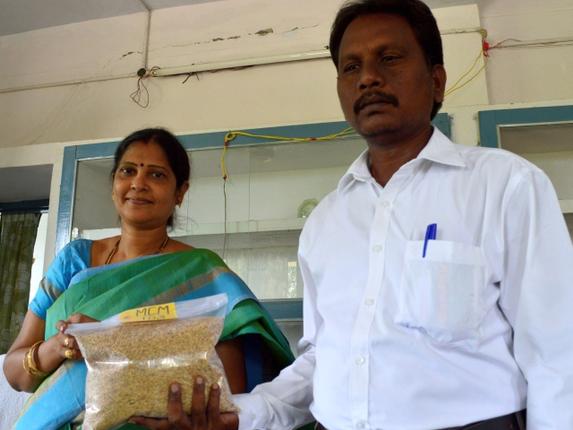
The seed varieties developed by Principal Scientist T. Anuradha and Scientist K. Nagendra Rao are MCM 103, a Kharif variety and Rabi variety MCM110, which are sanity resistant.
Plant breeding scientists of Acharya N.G. Ranga Agricultural University’s Research Station at Machilipatnam have developed two new paddy seed varieties, exclusively meant for saline soil and the 10-year research has yielded expected results.
The seed varieties developed by Principal Scientist T. Anuradha and Scientist K. Nagendra Rao are MCM 103, a Kharif variety and Rabi variety MCM110. The duration of crop period of the varieties is 140 and 120 days respectively.
“The Directorate of Rice Research (DRR), Hyderabad, has tagged the MCM 103 as the best paddy seed variety among the 40 entries from across the country in 2013. The DRR has also tested the variety in the six states, where it gave expected results including yield and quality grain”, T. Anuradha told The Hindu.
“The MCM-103 seed variety gives nearly six tonnes of yield while the MCM-110 gives up to 5.5 tonnes per hectare”, she added. The scientists have claimed that the yield of the two varieties would arguably be much higher in the normal soil. Another Scientist K. Nagendra Rao added that the MCM 103 is being tested in the saline fields in the coastal Andhra districts from the ongoing Kharif season and the other variety would also be tested from the next Rabi season in the State.
The District Agricultural Advisory & Transfer of Technology Centre in the respective districts in the State had selected the fields to test the seed varieties from the Kharif-2015. “The medium duration paddy varieties will primarily encourage the farmers to turn the saline soil fields into cultivable fields. The varieties will also ensure better yield”, opined Ms. Anuradha.
Farmers indebted to scientists:
The farmers having saline soil are indebted to the scientists, said Ms. Anuradha and Mr. Nagendra Rao, who had developed two paddy seed varieties – MCM 100 and 101- in 2011. It has been proposed for seeking approval of the Andhra Pradesh State’s Seed Varietal Release Committee for final release of the two varieties into the market.
source: http://www.thehindu.com / The Hindu / Home> News> Cities> Vijayawada / by T. Appala Naidu /Machilipatnam – July 31st, 2015